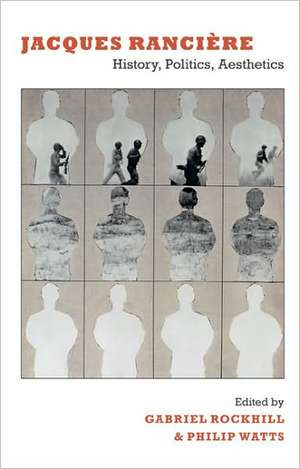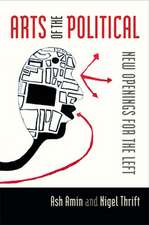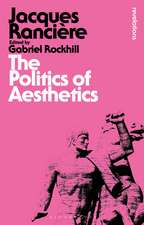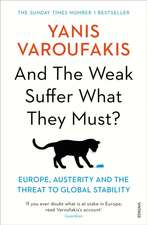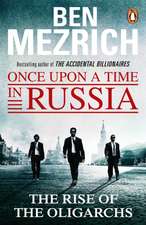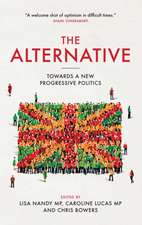Jacques Rancière – History, Politics, Aesthetics
Autor Gabriel Rockhill, Philip Wattsen Limba Engleză Paperback – 20 aug 2009
Preț: 229.40 lei
Nou
Puncte Express: 344
Preț estimativ în valută:
43.93€ • 45.27$ • 36.80£
43.93€ • 45.27$ • 36.80£
Carte tipărită la comandă
Livrare economică 24 februarie-10 martie
Preluare comenzi: 021 569.72.76
Specificații
ISBN-13: 9780822345060
ISBN-10: 0822345064
Pagini: 368
Dimensiuni: 153 x 226 x 23 mm
Greutate: 0.5 kg
Ediția:New.
Editura: MD – Duke University Press
Locul publicării:United States
ISBN-10: 0822345064
Pagini: 368
Dimensiuni: 153 x 226 x 23 mm
Greutate: 0.5 kg
Ediția:New.
Editura: MD – Duke University Press
Locul publicării:United States
Cuprins
Contents ; Introduction: Jacques Rancière: Penseur de lenvers: Gabriel Rockhill and Phil Watts ; I. History; 1: Historicizing Untimeliness: Kristin Ross; 2: The Lessons of Jacques Rancière: Knowledge and Power after the Storm: Alain Badiou; 3: Sophisticated Continuities and Historical Discontinuities, Or, Why Not Protagoras?: Eric Méchoulan; 4: The Classics and Critical Theory in Postmodern France: The Case of Jacques Rancière: Giuseppina Mecchia; 5: Rancière and Metaphysics: Jean-Luc Nancy; II Politics; 6: What Is Political Philosophy? Contextual Notes: Étienne Balibar; 7: Rancière in South Carolina: Todd May; 8: Political Agency and the Ambivalence of the Sensible: Yves Citton; 9: Staging Equality: Rancières Theatrocracy and the Limits of Anarchic Equality; Peter Hallward; 10: Rancières Leftism, Or, Politics and Its Discontents: Bruno Bosteels; 11: Jacques Rancières Ethical Turn and the Thinking of Discontents: Solange Guénoun; III Aesthetics; 12: The Politics of Aesthetics: Political History and the Hermeneutics of Art: Gabriel Rockhill; 13: Cinema and Its Discontents: Tom Conley; 14: Politicizing Art in Rancière and Deleuze: The Case of Postcolonial Literature: Raji Vallury; 15: Impossible Speech Acts: Jacques Rancières Erich Auerbach: Andrew Parker; 16: Style indirect libre: James Swenson; Afterword: The Method of Equality: An Answer to Some Questions: Jacques Rancière
Recenzii
In his contribution to this excellent edited volume, Alain Badiou situates the development of Jacques Rancie`res thought in the intellectual milieu of 1960s France. The defining issue that had emerged in this context concerned the relation between intellectual authority and social action, that is, the problem of transmission of revolutionary experience. Badiou outlines how Rancie`re has engaged in a struggle on two fronts in developing a response to this problem... This book draws together 16 critical responses to Rancie` res work, which emerged from conferences held at the University of Pittsburgh and the Centre Culturel International de Cerisy la Salle in 2005. The book is organized around Rancieres contribution to history, politics and aesthetics. - Andrew Schaap, Contemporary Political Theory
"It contextualises Rancière's work in a way that one cannot achieve through reading him directly, offering a companion to his core writings. In addition nearly all of the pieces infuse Rancière's work with a sense of urgency and timelessness that can often be lost in volumes focused on a single thinker.... Impressive and much-needed discussion of Rancière's thought and should prove invaluable to those with an interest in his work." Roger Glover, Political Studies Review, January 2012
What makes this volume the book that everyone interested in Jacques Rancière has to have is its incomparable roster of contributors. Rancière himself sets a standard of intellectual seriousness, and the contributors honour him by wrestling strenuously with his thought. They illuminate the trajectory of that thought and the connections between the historian of class and the philosopher of equality, the thinker of politics and the thinker of aesthetics. You can see why Rancière is one of the few French thinkers creating an ever greater excitement in North America. Bruce Robbins, author of Upward Mobility and the Common Good: Toward a Literary History of the Welfare State
This timely collection of essays should finally jump-start the English-speaking conversation about the work of Jacques Rancière, one of the most innovative political philosophers now writing. His method of equality, his contrast of a stable police order with the political as an interruption of that order by those invisible within it, and his idea that both politics and art involve modes of distributing/partitioning the sensible together form a unique constellation of radical political thinking.--J. M. Bernstein, New School for Social Research
"In his contribution to this excellent edited volume, Alain Badiou situates the development of Jacques Rancie're's thought in the intellectual milieu of 1960s France. The defining issue that had emerged in this context concerned the relation between intellectual authority and social action, that is, the problem of transmission of revolutionary experience. Badiou outlines how Rancie're has engaged in a 'struggle on two fronts' in developing a response to this problem... This book draws together 16 critical responses to Rancie' re's work, which emerged from conferences held at the University of Pittsburgh and the Centre Culturel International de Cerisy la Salle in 2005. The book is organized around Ranciere's contribution to history, politics and aesthetics." - Andrew Schaap, Contemporary Political Theory "It contextualises Ranciere's work in a way that one cannot achieve through reading him directly, offering a companion to his core writings. In addition nearly all of the pieces infuse Ranciere's work with a sense of urgency and timelessness that can often be lost in volumes focused on a single thinker... Impressive and much-needed discussion of Ranciere's thought and should prove invaluable to those with an interest in his work." Roger Glover, Political Studies Review, January 2012 "What makes this volume the book that everyone interested in Jacques Ranciere has to have is its incomparable roster of contributors. Ranciere himself sets a standard of intellectual seriousness, and the contributors honour him by wrestling strenuously with his thought. They illuminate the trajectory of that thought and the connections between the historian of class and the philosopher of equality, the thinker of politics and the thinker of aesthetics. You can see why Ranciere is one of the few French thinkers creating an ever greater excitement in North America." Bruce Robbins, author of Upward Mobility and the Common Good: Toward a Literary History of the Welfare State "This timely collection of essays should finally jump-start the English-speaking conversation about the work of Jacques Ranciere, one of the most innovative political philosophers now writing. His method of equality, his contrast of a stable 'police' order with 'the political' as an interruption of that order by those invisible within it, and his idea that both politics and art involve modes of distributing/partitioning the sensible together form a unique constellation of radical political thinking."--J. M. Bernstein, New School for Social Research
"It contextualises Rancière's work in a way that one cannot achieve through reading him directly, offering a companion to his core writings. In addition nearly all of the pieces infuse Rancière's work with a sense of urgency and timelessness that can often be lost in volumes focused on a single thinker.... Impressive and much-needed discussion of Rancière's thought and should prove invaluable to those with an interest in his work." Roger Glover, Political Studies Review, January 2012
What makes this volume the book that everyone interested in Jacques Rancière has to have is its incomparable roster of contributors. Rancière himself sets a standard of intellectual seriousness, and the contributors honour him by wrestling strenuously with his thought. They illuminate the trajectory of that thought and the connections between the historian of class and the philosopher of equality, the thinker of politics and the thinker of aesthetics. You can see why Rancière is one of the few French thinkers creating an ever greater excitement in North America. Bruce Robbins, author of Upward Mobility and the Common Good: Toward a Literary History of the Welfare State
This timely collection of essays should finally jump-start the English-speaking conversation about the work of Jacques Rancière, one of the most innovative political philosophers now writing. His method of equality, his contrast of a stable police order with the political as an interruption of that order by those invisible within it, and his idea that both politics and art involve modes of distributing/partitioning the sensible together form a unique constellation of radical political thinking.--J. M. Bernstein, New School for Social Research
"In his contribution to this excellent edited volume, Alain Badiou situates the development of Jacques Rancie're's thought in the intellectual milieu of 1960s France. The defining issue that had emerged in this context concerned the relation between intellectual authority and social action, that is, the problem of transmission of revolutionary experience. Badiou outlines how Rancie're has engaged in a 'struggle on two fronts' in developing a response to this problem... This book draws together 16 critical responses to Rancie' re's work, which emerged from conferences held at the University of Pittsburgh and the Centre Culturel International de Cerisy la Salle in 2005. The book is organized around Ranciere's contribution to history, politics and aesthetics." - Andrew Schaap, Contemporary Political Theory "It contextualises Ranciere's work in a way that one cannot achieve through reading him directly, offering a companion to his core writings. In addition nearly all of the pieces infuse Ranciere's work with a sense of urgency and timelessness that can often be lost in volumes focused on a single thinker... Impressive and much-needed discussion of Ranciere's thought and should prove invaluable to those with an interest in his work." Roger Glover, Political Studies Review, January 2012 "What makes this volume the book that everyone interested in Jacques Ranciere has to have is its incomparable roster of contributors. Ranciere himself sets a standard of intellectual seriousness, and the contributors honour him by wrestling strenuously with his thought. They illuminate the trajectory of that thought and the connections between the historian of class and the philosopher of equality, the thinker of politics and the thinker of aesthetics. You can see why Ranciere is one of the few French thinkers creating an ever greater excitement in North America." Bruce Robbins, author of Upward Mobility and the Common Good: Toward a Literary History of the Welfare State "This timely collection of essays should finally jump-start the English-speaking conversation about the work of Jacques Ranciere, one of the most innovative political philosophers now writing. His method of equality, his contrast of a stable 'police' order with 'the political' as an interruption of that order by those invisible within it, and his idea that both politics and art involve modes of distributing/partitioning the sensible together form a unique constellation of radical political thinking."--J. M. Bernstein, New School for Social Research
Textul de pe ultima copertă
"This timely collection of essays should finally jump-start the English-speaking conversation about the work of Jacques Ranciere, one of the most innovative political philosophers now writing. His method of equality, his contrast of a stable 'police' order with 'the political' as an interruption of that order by those invisible within it, and his idea that both politics and art involve modes of distributing/partitioning the sensible together form a unique constellation of radical political thinking."--J. M. Bernstein, New School for Social Research
Notă biografică
Gabriel Rockhill and Philip Watts, eds.
Descriere
Collection that examines the work of cultural and political theorist Jacques Rancière
